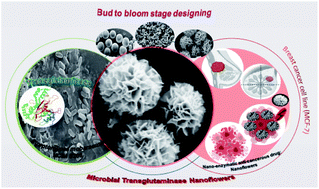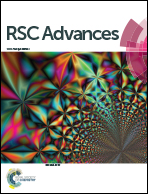Microbial transglutaminase nanoflowers as an alternative nanomedicine for breast cancer theranostics†
Abstract
Breast cancer is the most common malignancy among women. With the aim of decreasing the toxicity of conventional breast cancer treatments, an alternative that could provide appropriate and effective drug utilization was envisioned. Thus, we contemplated and compared the in vitro effects of microbial transglutaminase nanoflowers (MTGase NFs) on breast cancer cells (MCF-7). Transglutaminase is an important regulatory enzyme acting as a site-specific cross-linker for proteins. With the versatility of MTGase facilitating the nanoflower formation by acting as molecular glue, it was demonstrated to have anti-cancer properties. The rational drug design based on a transglutaminase enzyme-assisted approach led to the uniform shape of petals in these nanoflowers, which had the capacity to act directly as an anti-cancer drug. Herein, we report the anti-cancer characteristics portrayed by enzymatic MTGase NFs, which are biocompatible in nature. This study demonstrated the prognostic and therapeutic significance of MTGase NFs as a nano-drug in breast cancer treatment. The results on MCF-7 cells showed a significantly improved in vitro therapeutic efficacy. MTGase NFs were able to exhibit inhibitory effects on cell viability (IC50-8.23 μg ml−1) within 24 h of dosage. To further substantiate its superior anti-proliferative role, the clonogenic potential was measured to be 62.8%, along with migratory inhibition of cells (3.76-fold change). Drastic perturbations were induced (4.61-fold increase in G0/G1 phase arrest), pointed towards apoptotic induction with a 58.9% effect. These results validated the role of MTGase NFs possessing a cytotoxic nature in mitigating breast cancer. Thus, MTGase bestows distinct functionality towards therapeutic nano-modality, i.e., nanoflowers, which shows promise in cancer treatment.



 Please wait while we load your content...
Please wait while we load your content...